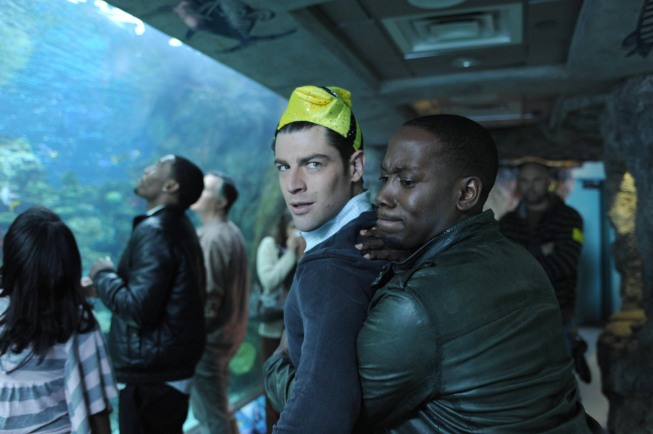 Orphan Black, Season 3, Episode 10, “History Yet to Be Written”
Orphan Black, Season 3, Episode 10, “History Yet to Be Written”
Written by Graeme Manson
Directed by John Fawcett
Airs Saturdays at 9pm (ET) on BBC America
Orphan Black has struggled this season, caught between genuinely moving character beats and an ill-defined series of plot points lacking the emotional depth necessary to get the audience particularly interested. For each scene of Helena enduring her capture by commiserating with her scorpion, there was one of Alison campaigning for an election few cared about. For each scene of Cosima’s adorable budding relationship with Shay, there was one of Dr. Coady acting vaguely evil. Orphan Black wrote itself into a corner with last season’s finale reveal of a separate line of male clones and despite a few powerful moments, such as Paul’s sacrifice or Sarah’s emotional conversation with Helena through the Project Castor prison walls, this season failed to deliver on the intrigue and promise of that cliffhanger, utterly failing to replicate the detailed character work that made audiences invest so fully in the Project Leda clones who power the story.
Looking to explore a dark alternate path for the Leda clones, the creative team took a totally new approach for Castor: What if the clones had been raised together, rather than disseminated into the population and monitored from a distance? The problem is the result—a group of nearly indistinguishable Castor clones—limited what actor Ari Millen could do in the role(s) and the series was unwilling to devote the time necessary to show the Castor clones starting to find their individuality after being sparked to do so by exposure to the outside world. Project Castor was quickly boiled down to two main clones, Mark and Rudy: the clone we’d already spent plenty of time with in season two and his blandly psychotic brother.
Comparing Rudy and Helena, his clear Leda counterpart, highlights the trouble at the core of season three’s Project Castor storyline. Whereas Helena was instantly fascinating, driven by an obsession with family and warped by her abusive captors, Rudy was simply sadistic, devoted to his Mother and demonstrating far less agency than Helena did even in her earliest scenes. She was quickly given a personality, fears, limits—she wouldn’t hurt a child—and most importantly, curiosity. Rudy, and by extension Millen, was never so fortunate; Rudy relished his violent orders, but betrayed little if any thought beyond this. And that’s fine. Not every character needs complex motivation or a sob story background. But when there are only two featured Castor clones and the other, Mark, is about as vanilla a Good Guy as his arc will allow, that makes for a far from thrilling main storyline for the season. This finale seems to recognize that, dispatching Rudy in a memorable and well-shot fight with Helena and leaving Dr. Coady in Franklin’s custody and apparently cloneless. Season four can now start fresh, free from the baggage of Castor, but with enough leeway that the writers can bring back Millen as Mark, or a new clone, should an interesting story present itself.
 Instead, the finale reintroduces the season one Neolutionists as a threat, upping the sci-fi quotient by threatening Delphine with an alien-seeming worm living inside Dr. Nealon. The series has done well with their more gonzo storylines and embracing the weird should give them plenty of interesting avenues to explore, pitting the fairly normal Leda clones against the bizarre and potentially frightening. Dr. Leekie eventually became a drag on season one and the writers will need to take care with the apparent core leadership of the Neolutionists, Rachel’s mother and potentially (at least based on Charlotte’s presence) Dr. Marian Bowles. Still, doubling down on the series’ genre elements and moving away from the mundane (season two’s cult storyline, season three’s adventures in drug dealing) is absolutely a step in the right direction.
Instead, the finale reintroduces the season one Neolutionists as a threat, upping the sci-fi quotient by threatening Delphine with an alien-seeming worm living inside Dr. Nealon. The series has done well with their more gonzo storylines and embracing the weird should give them plenty of interesting avenues to explore, pitting the fairly normal Leda clones against the bizarre and potentially frightening. Dr. Leekie eventually became a drag on season one and the writers will need to take care with the apparent core leadership of the Neolutionists, Rachel’s mother and potentially (at least based on Charlotte’s presence) Dr. Marian Bowles. Still, doubling down on the series’ genre elements and moving away from the mundane (season two’s cult storyline, season three’s adventures in drug dealing) is absolutely a step in the right direction.
With that move comes the potential death of Delphine, who says a heartfelt goodbye to Cosima before being shot point blank. We don’t see her technically die and genre fans know well that this means she could easily start next season healing up in the hospital, but her two final scenes are powerful regardless. Cosima and Delphine’s breakup was poorly defined all season, with Cosima inexplicably bitter towards Delphine yet presented as being in the right, but the storyline gave Tatiana Maslany and Evelyne Brochu some nice beats to play. Things are left very much up in the air with Shay, but whichever way the new season progresses Cosima’s love life, this arc will hopefully be greatly shaped by the challenges presented this season. Far more reliable has been Josh Vockey’s Scott, who was given much more to do and even a bit of a personal life (Note to the writers: Nothing bad is allowed to happen to that cat!). Maslany may remain Orphan Black’s main draw, but strengthening the supporting players can only improve the disparate corners of the show.
Nowhere is this more evident than with Donnie and Alison. The first half of the season struggled tremendously with Alison, miring her in a local election she shouldn’t have had time for and which completely isolated her and Donnie from the rest of Clone Club. Despite some fun material with Alison’s high school sweetheart, Jaje (Jayge?), high stakes action was happening with every other clone and each cut to Alison felt like a distraction. Fortunately, that changed when Helena and Gracie entered the picture. As happens with each character she’s paired with, putting Donnie and Helena together instantly elevated Donnie’s storyline, sparking a new and interesting friendship and fully integrating Donnie with Clone Club. Helena is at her best when interacting with the show’s most down to earth characters, particularly when the situation puts her in the role of savior. Donnie is Helena’s most entertaining counterpoint yet, though it is nice to see Jesse’s Towing make a return, and hopefully the two will get into plenty of wacky (and less violent) misadventures next season.
 The fact that Donnie, Scott, and Shay have all come up before Felix highlights another of the season’s weaknesses: Jordan Gavaris has been criminally underserved. He gets a badass moment in the finale, kicking in Mark and Gracie’s door, but aside from Felix’s fantastic exchange with Crystal, (may she never leave), his consoling of Cosima, and his stellar big brothering of Gracie, Gavaris has been completely marginalized this season. Felix is wonderful as a partner in crime for Sarah, but the character is in desperate need of his own life and motivations. Sarah has long been established as selfish, taking much more in their relationship than she gives, but three seasons in, leaving Felix so completely in Sarah’s shadow and orbit undermines the character. The same is true of Mrs. S, who similarly had little agency outside of Sarah this season. Her one scene with Gracie was tremendously affecting, a striking reminder of how good the character can be when properly deployed. The end of season introduction of Kendall should have given the character more to do, and Maria Doyle Kennedy wrings a few affecting moments out of the storyline, but the characters are so abrasive in their few scenes that the audience gets little if any chance to explore the weight of these revelations. They’re plot driven, rather than character driven, and in a season so concerned with plot, this makes them blend in with the background noise rather than stand out. Sarah’s most powerful moments of the season remain the amazing performances Maslany (with the support of her stand-in, Kathryn Alexandre) delivered in Sarah’s scenes with Helena, as well as the absolutely lovely final shot of Sarah and Kira. After sending her off this season on one quest after another, fingers crossed season four will put Sarah on the back burner a bit and let her feel more human, an involved mother to her child and supportive sister and daughter to those who have done so much for her over the series.
The fact that Donnie, Scott, and Shay have all come up before Felix highlights another of the season’s weaknesses: Jordan Gavaris has been criminally underserved. He gets a badass moment in the finale, kicking in Mark and Gracie’s door, but aside from Felix’s fantastic exchange with Crystal, (may she never leave), his consoling of Cosima, and his stellar big brothering of Gracie, Gavaris has been completely marginalized this season. Felix is wonderful as a partner in crime for Sarah, but the character is in desperate need of his own life and motivations. Sarah has long been established as selfish, taking much more in their relationship than she gives, but three seasons in, leaving Felix so completely in Sarah’s shadow and orbit undermines the character. The same is true of Mrs. S, who similarly had little agency outside of Sarah this season. Her one scene with Gracie was tremendously affecting, a striking reminder of how good the character can be when properly deployed. The end of season introduction of Kendall should have given the character more to do, and Maria Doyle Kennedy wrings a few affecting moments out of the storyline, but the characters are so abrasive in their few scenes that the audience gets little if any chance to explore the weight of these revelations. They’re plot driven, rather than character driven, and in a season so concerned with plot, this makes them blend in with the background noise rather than stand out. Sarah’s most powerful moments of the season remain the amazing performances Maslany (with the support of her stand-in, Kathryn Alexandre) delivered in Sarah’s scenes with Helena, as well as the absolutely lovely final shot of Sarah and Kira. After sending her off this season on one quest after another, fingers crossed season four will put Sarah on the back burner a bit and let her feel more human, an involved mother to her child and supportive sister and daughter to those who have done so much for her over the series.
Despite the frustrations detailed above, Orphan Black remains an engaging show, a series capable of highs so exhilarating they make slogging through the down episodes absolutely worthwhile. This finale may not be the show at its peak, but it demonstrates an awareness of what works and what doesn’t, and now that the characters are all together and (mostly) happy, their heartwarming family dinner a nice realization of the imagined barbeque that started the season, hopefully season four will bring a fresh start for the characters and the series as a whole.




